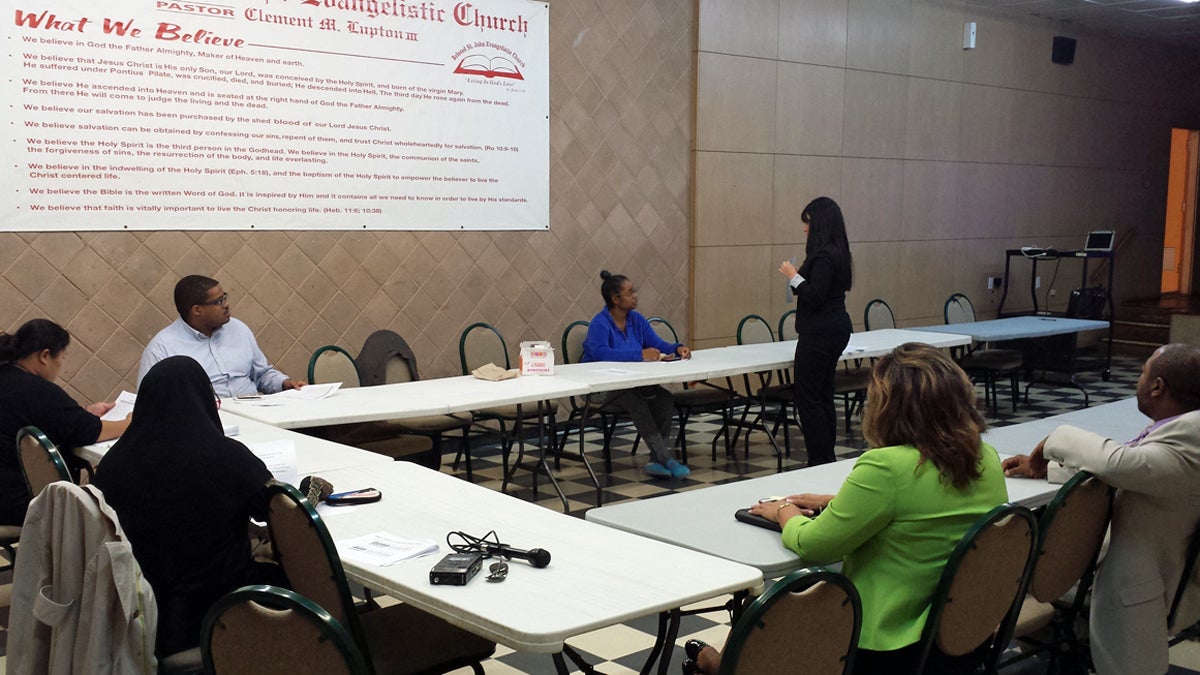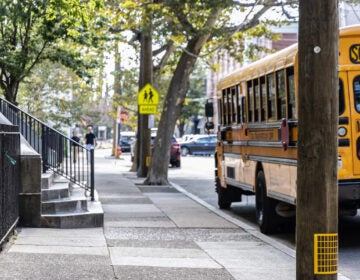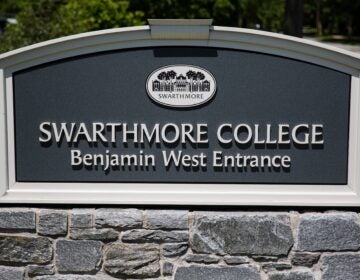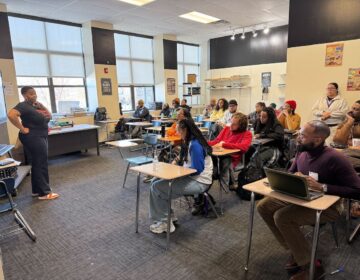Parents at Philly’s Cooke Elementary push back against charter conversion
Listen
District staffers look on as assistant superintendent Randi Davila begins her presentation to the one Cooke parent present at the beginning of the meeting. At its peak, attendance reached about a dozen Cooke parents. (Kevin McCorry/WHYY)
It began with a whimper, ended with a bang.
On Tuesday evening, the Philadelphia School District hosted its first parent engagement meeting on its plan to convert Jay Cooke Elementary School in Logan into a neighborhood based charter.
Last Thursday, the district announced a set of sweeping proposals that would affect 15 schools and 5,000 students — moves that include new school openings, closings and district-led and charter conversions.
Cooke is one of three district elementary schools that Superintendent William Hite has tapped to become a neighborhood based charter starting in 2015-16.
The meeting for Cooke was to start at 6 p.m., but with the room empty save for district officials and journalists, leaders opted to wait a bit.
When new assistant superintendent, Randi Davila, commenced the district’s presentation 15 minutes later, only one Cooke parent was in attendance.
An hour into the gathering, attendance peaked at a little more than a dozen parents. The school serves more than 400 students.
Many of the parents in attendance attributed the small showing to the district’s convoluted method for informing the community of the details of the meeting.
It purposely omitted the meeting’s address from the letter it mailed to parents that alerted them of the district’s plan.
To find out the details, parents were supposed to call a special hotline, leave a message, and then wait for a call back from a district staffer.
Parent Renita Brown, who has a seventh grader at Cooke, called this process “nonsense” and “oxymoronic.”
She said many parents assumed the meeting would be held in the school’s auditorium. Instead, it was held at the nearby Beloved St. John Evangelist Church — where no signs or banners were hung to help people find the meeting’s location.
Brown, a breast cancer survivor who suffers from a sometimes debilitating case of fibromyalgia, took it upon herself to alert the community of the details that the district withheld.
“There’s no address on there. So therefore, I, out of my own pocket money, got fluorescent color poster boards, taped it around poles and trees, and posted it all around the gates of the school so parents could know to come to this location,” she explained.
First-year Cooke principal Michael Reid also complained about the protocol. He heard from parents who were confused by the automated phone message.
“I think that [call] should go right to a person,” he told Evelyn Sample-Oates, the district chief of family & community engagement before Tuesday night’s meeting.
District staffers say they opted to hold the meeting at the nearby church and withhold the address from the letter in order to ensure a small gathering of parents.
They specifically hoped to limit the number of teachers and outside advocates from the meeting.
They said no one would be turned away, but stressed the need for intimate dialogue among family stakeholders.
Lessons of the last renaissance
The district last proposed renaissance charter conversion in spring 2014. Then, it hoped to see Mastery Charter School assume control of Edward T. Steel elementary in Nicetown, and see Aspira take over Luis Munoz-Marin elementary in Fairhill.
In that process, the district asked parents to vote to accept or reject the charter conversion. In both cases — after several raucous meetings held in the schools’ respective auditoriums — parents voted to remain under district control.
Following that vote, district leaders, including then-School Reform Commission Chair Bill Green attributed the election result to the overbearing influence of the Philadelphia Federation of Teachers and the other like-minded advocates.
This time around, the district is taking another approach.
Parents will not get to vote for or against charter conversion. A few will be invited (in a still to-be-determined way) to join a review committee (of still to-be-determined size) that will have a say on which charter operator Hite will eventually propose to the SRC as a match for the school.
SRC members will vote on the conversion on Jan. 21, 2016.
This information, though, was not explicitly communicated to parents at Tuesday night’s 90-minute meeting. Many left the gathering still thinking they would have a larger say in the matter.
When I informed Renita Brown of this information as parents filtered out, she became upset.
“No it was not at all communicated that way,” she said. “I’m very, very enraged, and I’ve got a lot of praying to do.”
The pitch
With parents sitting around folding tables in the hall of the Beloved St. John Evangelist Church, district leaders explained that Cooke had been chosen for charter conversion because of its chronically poor performance in academics and culture.
Based on state tests, fewer than four in 10 students are able to complete math at grade level; for reading, fewer than three in 10 can make the grade. Seventy-one percent of third graders are not reading on grade level.
The district did not take 2014-15 state tests scores into account in its rationale for converting Cooke. Scores statewide plummeted this year with the implementation of more rigorous standards and expectations.
Assistant superintendent Davila explained that other factors were considered too — including the school’s high teacher turnover rate, and the fact that half of the parents in the neighborhood already choose against sending their children to the school.
In 2012-13, the district had recommended Cooke for closure. Parents fought back and kept the school open with the hope of improvement.
“We sit here several years later with similar concerns and even more declining academic and safety issues,” Davila told parents.
Just as district leaders had hoped, only parents and community stakeholders attended the meeting. Teachers, union leaders and advocates for traditional public schools were not present.
Still, none in attendance seemed swayed by the district’s rationale.
Many parents argued that Cooke could rebound under district control if given a strong leader and adequate classroom-level resources.
“Has anybody looked at what the charter school is doing, and if you gave the same supports to the public school teachers, wouldn’t the children perform?” said one parent.
Deborah Azore, the president of both the Home and School Association and the School Advisory Committee, described the district’s proposal as “a real kick in the face.”
“It would be nice to stay a district public school,” said Azore. “At least the community could have at least one.”
Parents complained that the school district had set them up for failure by installing what they perceived to be a weak school leader in recent years.
This year, through the first month of leadership under new principal Michael Reid, parents boasted a much better culture in the school.
“I can see the difference in the couple of weeks that he’s been there,” said another parent.
“What’s there right now is good enough for my child,” Renita Brown yelled above a cacophony of voices. “What was there previously was not good enough.”
As the meeting grew more heated, assistant superintendent Davila hoped to steer parents towards common ground.
“Everyone in the room wants the same thing,” she said. “And that’s what we have to remember. What do we want?”
“No charters,” many parents chimed in.
“We want a great school,” said Davila.
Some parents voiced distrust of charters for their enrollment practices and feared that their children would be pushed out if they fell behind academically or committed disciplinary infractions.
Davila promised that all current students would be accepted by the charter provider, and pointed to the success of the 20 existing renaissance charters.
She said that city families have a track record of returning their children to neighborhood schools once charters take over. The district says 1,800 students were turned away from existing renaissance schools last year because of cap restrictions.
A December 2013 report found that most of the renaissance charters made gains in reading and math. Most also saw declines in violent incidents.
Only Mastery, though, has managed to keep and maintain dramatic academic gains.
For parents at Cooke, the most familiar comparison is the conversion of nearby Birney Academy — which became a renaissance charter run by Mosaica in 2011.
In July, the school was quietly transferred to American Paradigm in a move that district officials say did not require an SRC vote. Mosaica, a national, for-profit charter operator, was ordered by a federal judge into fiscal receivership last October.
At Tuesday night’s meeting, Birney parent Crystal Bolden testified to the great gains made at the school since its conversion.
“I’ve been pleased with it,” she said. “My children are at or above the grade level that they need to be.”
Melody Sanders, who has a second grader at Cooke, was not moved by the testimony.
“What did Birney do?” she asked. “They’re not good.”
Birney’s test scores in recent years have been slightly better than those at Cooke, but have also declined in recent years.
Below is a comparison of Cooke’s and Birney’s proficiency rates in recent years on the Pennsylvania System of School Assessment (PSSA) test.
Math:
|
Reading:
|
Science:
|
2012-13 |
2013-14 |
|
|
Cooke (district run) |
19% |
28% |
|
Birney (Mosaica) |
43% |
31% |
Birney’s first year as a renaissance charter saw the rate of violent incidents spike dramatically.
Moving forward
The School district plans to hold parent meetings every Tuesday through Nov. 24 from 6 to 7:30 p.m. at 4541 N. Broad St. to discuss Cooke’s proposed conversion.
A similar meeting was held Tuesday evening during the same timeframe at 5120 Chestnut St. for the proposed conversion of Huey elementary. These, too, are scheduled to run through November.
On Wednesday evening, the district will hold its first parent meeting for the proposed conversion of Wister Elementary at nearby 5818 Germantown Ave.
The district will release its request for proposals form for potential charter operators on Oct. 15. The committee representing each school will review applications from Nov. 2 through Dec. 7.
Leaving the meeting, some Cooke parents promised that they would be back to fight the changes in greater numbers at next week’s meeting.
With an exhale of weary pragmatism, HSA president Azore said she doubts that will prove to be a productive endeavor.
“It’s like it’s already written in stone. So what can you do? If you’re fighting it, I believe it will be a lost battle,” she said. “If the charter school is best for the children, let it be charter.”
WHYY is your source for fact-based, in-depth journalism and information. As a nonprofit organization, we rely on financial support from readers like you. Please give today.





